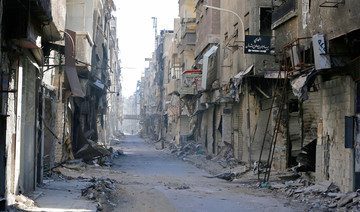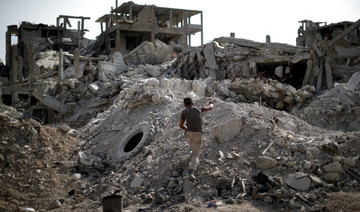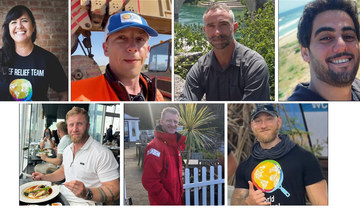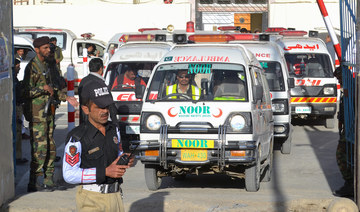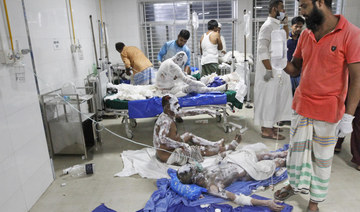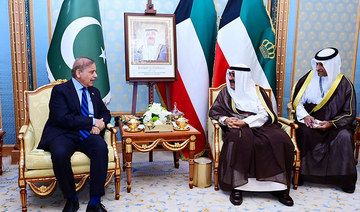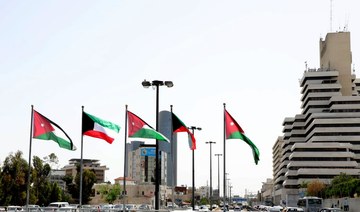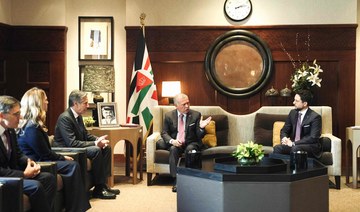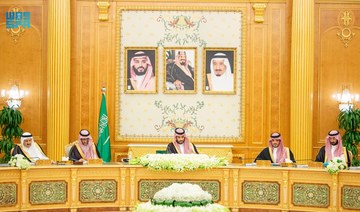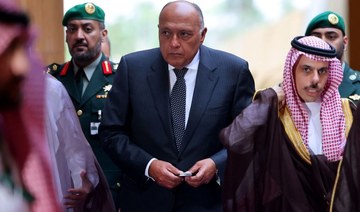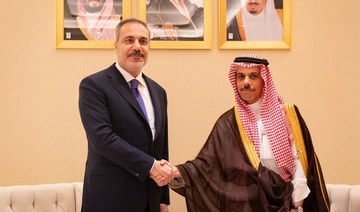BEIRUT: Syria’s largest Palestinian camp was once bustling with activity: It was crowded with mini-buses and packed with shops hawking falafel, shawarma and knafeh nabulsieh — a sweet concoction of cheese and phyllo dough.
Kids played soccer and brandished plastic guns until men with real guns came in when Syria descended into civil war. Over the past decade, fighting devastated communities across the country, including the Yarmouk camp, on the outskirts of the capital of Damascus.
Today, Yarmouk’s streets are still piled with rubble. Scattered Palestinian flags fly from mostly abandoned houses, the only reminder that this was once a major political and cultural center of the Palestinian refugee diaspora.
Two years ago, Syrian authorities began allowing former Yarmouk residents who could prove home ownership and pass a security check to come back.
But so far, few have returned. Many others have been deterred by fear they could be arrested or conscripted by force. Others no longer have houses to come back to. Still, with the fighting having subsided in much of Syria, some want to see what’s left of their homes.
Earlier this month, the government opened up Yarmouk for a rare visit by journalists to highlight its push for returnees. The occasion: the launch of a new community center, built by a non-government organization.
One of those who have returned is Mohamed Youssef Jamil. Originally from the Palestinian village of Lubya, west of the city of Tiberias in present-day Israel, he had lived in Yarmouk since 1960. He raised three sons in the camp, before Syria’s war broke out.
The 80-year-old came back a year and a half ago, with government approval to repair his damaged house. Of the 30 or 40 families who used to live on his street, there are now four. Many buildings that were not leveled by bombs were looted, stripped of windows, electric wiring — even faucets.
“I’m staying here to guard it from thieves,” he said of his home.
Nearby, the right half of Mohamed Taher’s house has collapsed, while he is repairing the still-standing left half. “There is no electricity,” the 55-year-old said, though in some parts of the camp there is water and the sewer system works.
Yarmouk was built in 1957 as a Palestinian refugee camp but grew into a vibrant suburb that also attracted working-class Syrians. Before the 2011 uprising turned civil war, some 1.2 million people lived in Yarmouk, including 160,000 Palestinians, according to the UN agency for Palestinian refugees, or UNRWA.
As of June, some 4,000 people returned to Yarmouk, UNRWA said, while another 8,000 families received permission to return over the summer.
The returnees struggle with a “lack of basic services, limited transportation, and largely destroyed public infrastructure,” UNRWA said. Some live in houses without doors or windows.
The UN agency said returns to Yarmouk increased, in part, because the camp offered free housing. At a recent press conference, UNRWA chief Philippe Lazzarini said an increasing number of Palestinian refugees in Syria are “basically going back into rubble just because they cannot afford anymore to live where they were.”
In the past, Palestinian factions in Syria sometimes had a complicated relationship with Syrian authorities. Former Syrian President Hafez Assad and Palestinian Liberation Organization leader Yasser Arafat were bitter adversaries.
However, Palestinian refugees lived in relative comfort in Syria, with greater socioeconomic and civil rights than those in neighboring Lebanon.
Yarmouk’s Palestinian factions tried to remain neutral as Syria’s civil war broke out, but by late 2012, the camp was pulled into the conflict and different factions took opposing sides in the war.
The militant group Hamas backed the Syrian the opposition while others, like the Popular Front for the Liberation of Palestine–General Command, fought on the Syrian government’s side.
In 2013, Yarmouk became the target of a devastating siege by government forces. In 2015, it was taken over by the extremist Daesh group. A government offensive retook the camp in 2018, emptying it of remaining inhabitants.
Sari Hanafi, a professor of sociology at the American University of Beirut who grew up in Yarmouk, said those returning are doing so because of “absolute necessity.”
“The others who don’t return — it’s because it’s an unlivable place,” he said.
A young man from Yarmouk living in a Palestinian refugee camp in Lebanon agrees. With Syrian President Bashar Assad’s government still firmly in place, he said that if he went back, he “would always be living in anxiety and without security.”
“Someone who returns to the camp, or to Syria in general, is no longer thinking, ‘How much freedom will I have?’ He is thinking, ‘I just want a house to live in,’” he said, speaking on condition of anonymity, fearing for the safety of his relatives back in Syria.
At the community center’s opening, the governor of Damascus, Mohamed Tarek Kreishati, promised to clear the rubble and restore utilities and public transportation.
But there’s a long way to go to convince people to go back, said Mahmoud Zaghmout from the London-based Action Group for Palestinians of Syria, aligned with the Syrian opposition.
Yarmouk lacks “hospitals, bakeries, gas distribution centers and basic consumer and food items,” Zaghmout said.
There are those who hope Yarmouk will be restored to its past glory, like Suheil Natour, a Lebanon-based researcher and member of the leftist Democratic Front for the Liberation of Palestine.
He pointed to Lebanon’s Palestinian refugee camp Ein el-Hilweh, which was razed by Israeli forces in 1982 and later rebuilt. Yarmouk can also be “one day a very flourishing symbol of revival of the Palestinian refugees,” he said.
Others are skeptical. Samih Mahmoud, 24, who grew up in Yarmouk but now lives in Lebanon, said not much remains of the place he remembered.
He said he’s not attached to the buildings and streets of Yarmouk. “I’m attached to the people, to the food, to the atmosphere of the camp,” he said. “And all of that is gone.”
Some return to war-battered hub of Palestinian life in Syria
https://arab.news/9k9qk
Some return to war-battered hub of Palestinian life in Syria
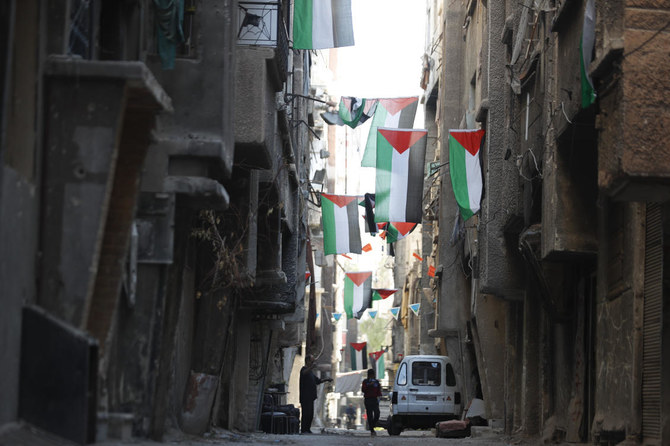
- Two years ago, Syrian authorities began allowing former Yarmouk residents who could prove home ownership
- Yarmouk was built in 1957 as a Palestinian refugee camp but grew into a vibrant suburb
UN Palestinian agency chief seeks probe into treatment of Gaza staff by Israel
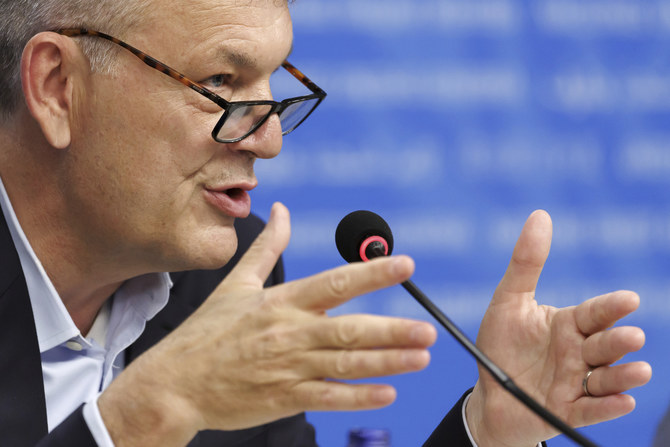
- Lazzarini said Israel blocked him from entering Gaza last month, and that he plans to visit again on Sunday. He voiced hope that Israel would let him in
- Israel has killed more than 34,000 Palestinians in Gaza, mostly women and children, according to the health ministry in the Hamas-run territory
GENEVA: The head of the UN agency for Palestinian refugees, UNRWA, called on Tuesday for countries to back an independent investigation into alleged killings and detentions of its staff and damage to its premises once the Israel-Hamas conflict ends.
UNRWA has accused Israel of targeting its facilities during more than seven months of conflict in the Gaza Strip, and said 182 of its staff there had been killed and more than 160 of its shelters hit, resulting in the deaths of hundreds of people fleeing Israeli bombardment.
After briefing UN member states in Geneva, UNRWA Commissioner-General Philippe Lazzarini told reporters he wanted the countries to back an independent investigation “to look into this blatant disregard of the United Nations in order to avoid that this becomes also in the future the new standard.”
Israel’s diplomatic mission in Geneva reacted by accusing UNRWA of complicity with Hamas, saying the militant group was embedded within the UN agency’s infrastructure.
Lazzarini said Israel blocked him from entering Gaza last month, and that he plans to visit again on Sunday. He voiced hope that Israel would let him in. UNRWA is the biggest humanitarian aid provider in Gaza where its 13,000 staff there also run schools and social services for the refugees who make up the majority of Gazans.
Israel accuses 19 of its staff members of taking part in the Oct. 7 Hamas attacks against Israel that killed 1,200 people and triggered Israel’s military offensive.
Israeli Prime Minister Benjamin Netanyahu has called for UNRWA to be shut down, saying it seeks to preserve the issue of Palestinian refugees. A review of the agency’s neutrality said Israel had yet to provide evidence for its accusations that a significant number of UNRWA staff were members of terrorist groups and Lazzarini said that all but a handful of countries had now unblocked funds they had paused after the Israeli allegations.
He listed those still withholding funds as the US, Britain, Austria and his native Switzerland.
The Swiss lower house’s foreign affairs committee on Tuesday narrowly voted to partly unblock financial aid to UNRWA solely for humanitarian ends, a step that needs further parliamentary approval.
Some $267 million in total remains blocked, Lazzarini said, based on a tally of countries’ prior commitments. The agency has raised $115 million in private funding, he added.
Another UN investigation into the allegations against UNRWA staff members is still under way.
Food and other humanitarian aid supplies to Gaza have improved in April, but there is still far from enough to reverse the trend toward famine, he said.
“We are engaged in a race against the clock to reverse the spreading of hunger and the looming famine especially in the northern part,” he said.
Gas blast kills eight at Beirut restaurant: minister
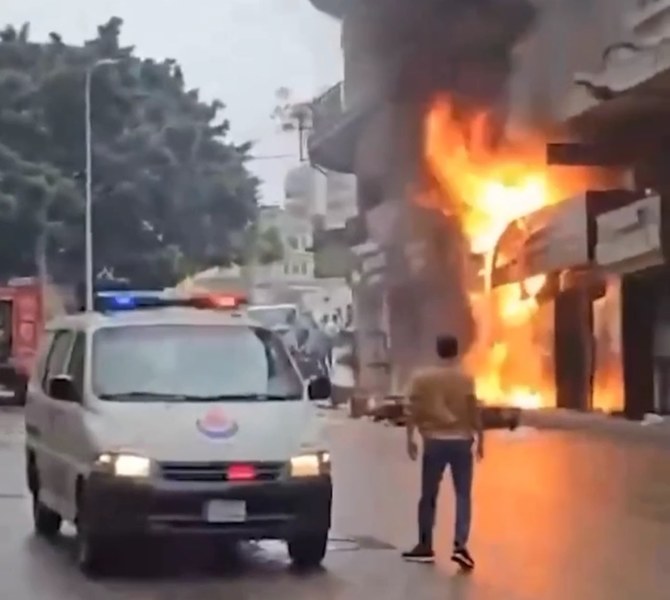
- The firefighters put out a blaze in a small restaurant in Beirut after “a gas leak caused an explosion at the restaurant”
BEIRUT: A fire caused by a gas canister explosion killed at least eight people at a restaurant in Beirut on Tuesday, a Lebanese government minister and firefighters said.
The state-run National News Agency quoted the Beirut Fire Brigade as saying that “eight victims died of suffocation inside the restaurant.”
The firefighters put out a blaze in a small restaurant in Beirut after “a gas leak caused an explosion at the restaurant,” NNA added, quoted the same source.
Interior Minister Bassam Mawlawi toured the site, also telling reporters at least eight people had been killed “by suffocation” in the blast.
Some lawmakers representing Beirut also visited, with parliament member Ibrahim Mneimneh questioning safety standards at the restaurant.
The accident “shows this place was not in line with public safety standards,” he said.
Lebanon’s economy has been in free-fall since late 2019, worsening a long-running public oversight problem in different sectors, especially with regard to public safety.
Kuwait launches anti-smoking campaign to safeguard children
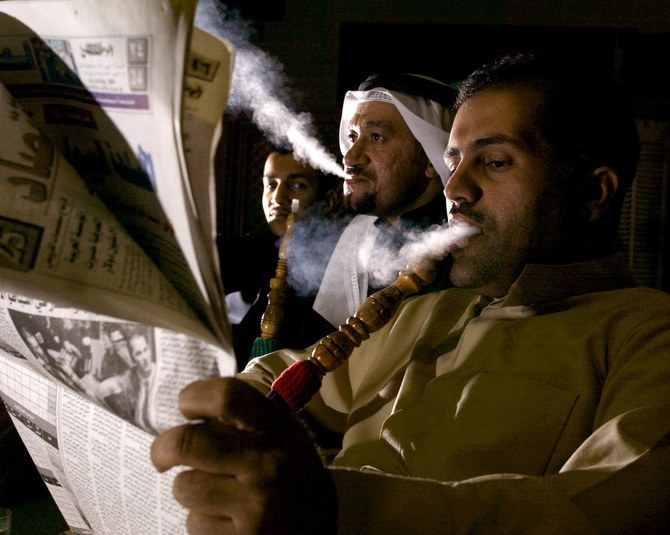
- WHO reveal a threefold increase globally in e-cigarette usage among children aged 13-15 compared to adults
LONDON: The Kuwaiti Ministry of Health will launch an anti-smoking awareness campaign on Thursday aimed at safeguarding children from the dangers of tobacco, the Kuwait News Agency reported on Tuesday.
Collaborating with various ministries and state agencies, the campaign will underscore the critical need to protect vulnerable populations from the hazards of smoking.
Dr. Abeer Al-Baho, director of the ministry’s Health Promotion Department, said the awareness drive will be inclusive by reaching out to men, women, and children alike.
The campaign will highlight the detrimental effects of smoking, shed light on the legal ramifications for those found to be smoking in unauthorized areas, and particularly safeguard individuals with health vulnerabilities, minors, and the environment.
Al-Baho stressed the campaign’s pivotal role in curbing smoking-related diseases and fatalities, emphasizing the direct and indirect harm caused to the lungs and heart and the links with many types of cancer.
Scheduled to run until May 31, coinciding with World No Tobacco Day, the campaign will span all six Kuwaiti governorates, featuring demonstrations that show the hazards of smoking.
Disturbing statistics from the World Health Organization reveal a threefold increase globally in e-cigarette usage among children aged 13-15 compared to adults, prompting urgent warnings about the risks posed by tobacco in its various forms, including traditional smoking and e-cigarettes.
Blinken says he will press Netanyahu on Gaza aid measures during Israel trip
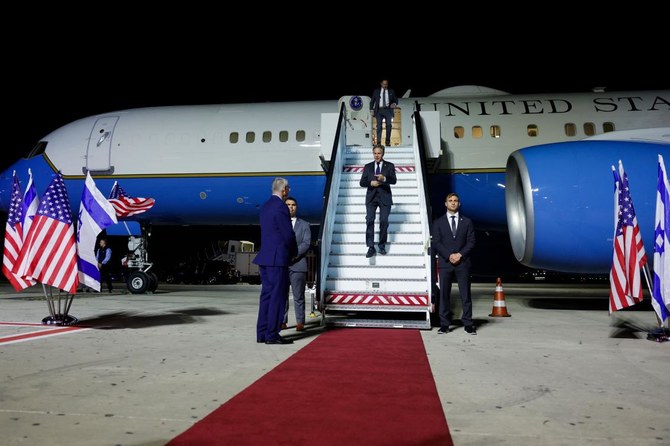
- Visit comes month after US President Biden issued stark warning to Israeli PM
- Blinken on a tour of Middle East, seventh since region plunged into conflict on Oct. 7
AMMAN: US Secretary of State Antony Blinken said on Tuesday he would discuss with Prime Minister Benjamin Netanyahu measures that Israel still needs to take to increase the flow of aid into Gaza during his planned talks in the country on Wednesday.
Blinken arrived in Israel on Tuesday to also push for a much awaited ceasefire between Israeli forces and Hamas militants in Gaza.
Ahead of his arrival in Israel, Blinken spoke to reporters at a warehouse of the Jordan Hashemite Charity Organization where aid shipments from US-based charities are gathered.
While there are some improvements in the humanitarian aid situation in the densely populated enclave, he said, much more needs to be done to ensure assistance reaches people in a sustained manner.
“I’m now able to go to Israel tomorrow and go over with the Israeli government the things that still need to be done if the test is going to be met of making sure that people have what they need,” Blinken said.
“And I’ll be doing that (on Wednesday) directly with Prime Minister Netanyahu and other members of the Israeli government,” he said.
Blinken’s check-in with Netanyahu on aid will take place about a month after US President Joe Biden issued a stark warning to Netanyahu, saying Washington’s policy could shift if Israel fails to take steps to address civilian harm, humanitarian suffering, and the safety of aid workers.
A spiraling humanitarian crisis has prompted calls from Israel’s Western and Arab partners to do more to facilitate the entry of aid to Gaza, where most people are homeless, many face famine, disease is widespread, and where much civilian infrastructure lies in ruins.
REGIONAL TOUR
Blinken is on a tour of the Middle East, his seventh since the region plunged into conflict on Oct. 7 when Palestinian Hamas militants attacked Israel, killing 1,200 people and abducting 253 others, according to Israeli tallies.
In response, Israel has launched a relentless assault on Gaza, killing more than 34,000 Palestinians, local health authorities say, in a bombardment that has reduced the enclave to a wasteland. More than one million people face famine, the United Nations has said, after six months of war.
The first shipments of aid directly from Jordan to northern Gaza’s newly opened Erez crossing will leave on Tuesday, goods are also arriving via the port of Ashdod, and a new maritime corridor will be ready in about a week, Blinken said.
“But more still needs to be done,” he said. “We still have to have a deconfliction mechanism that’s effective and works — that’s a work in progress,” Blinken added.
He said there should also be a clear list of items needed in Gaza to avoid “arbitrary denials” — a reference to a process of rigorous inspections of aid shipments that has seen some trucks stranded at border crossings.
US and Egyptian presidents warn of danger of military escalation in Rafah
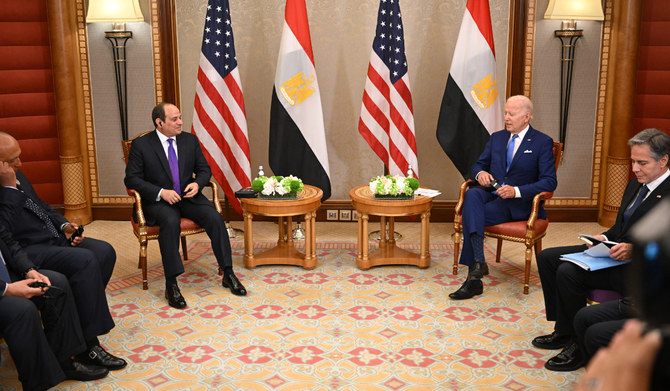
- The leaders say an Israeli assault on the Gazan city would exacerbate the humanitarian crisis and have repercussions on security and stability across the region
CAIRO: The Egyptian president, Abdel Fattah El-Sisi, and his US counterpart, Joe Biden, on Tuesday discussed the efforts being made by Egypt to encourage a ceasefire agreement in Gaza between Israel and Hamas and secure the release of hostages.
Ahmed Fahmy, a spokesperson for the presidency, said the two leaders expressed concern about the potential danger of a threatened Israeli military escalation in the city of Rafah in southern Gaza, which has become the final refuge for more than a million Palestinians displaced by fighting from other parts of the territory. They said it would add a further, catastrophic dimension to the already worsening humanitarian crisis in Gaza, and have wider repercussions on security and stability across the region.
The war began with the Oct. 7 attacks by Hamas on Israel, in which 1,170 people were killed, according to a tally by news agency Agence France-Presse. The militants also took about 250 hostages; Israeli authorities estimate 129 of them are still being held in Gaza, including 34 believed to be dead.
During Biden’s telephone call to El-Sisi, the Egyptian president stressed the need for humanitarian aid workers to be granted full and unrestricted access to Gaza, and highlighted the intensive efforts Egypt has been making in support of the aid effort.
The presidents agreed on the importance of preventing any regional expansion of the conflict, and reaffirmed that a two-state solution to the long-running dispute between Israel and Palestine is the best way to achieve peace, security and stability in the Middle East.
They also highlighted the strategic partnership between Egypt and the US, and their continuing efforts to strengthen bilateral cooperation at all levels.



